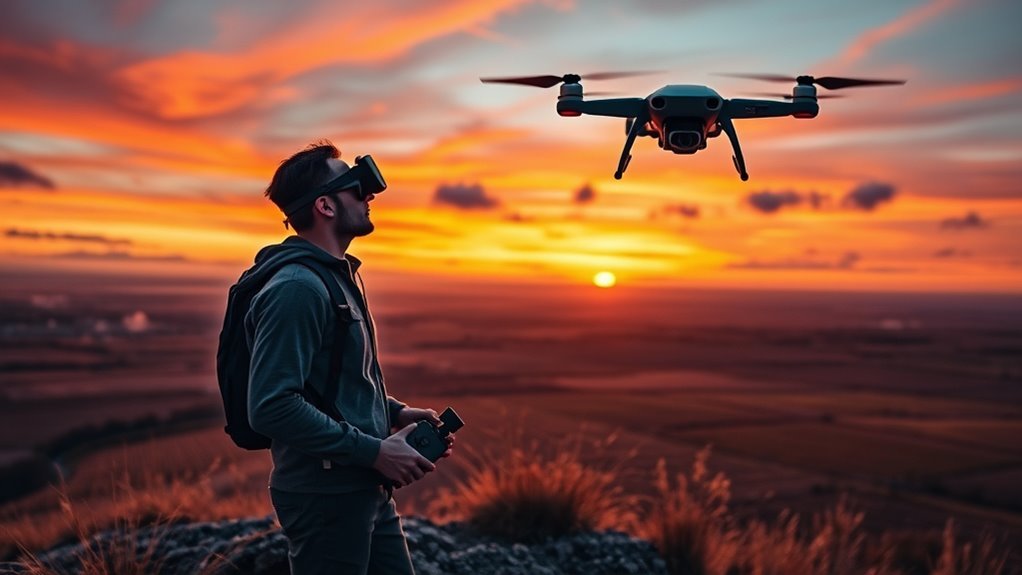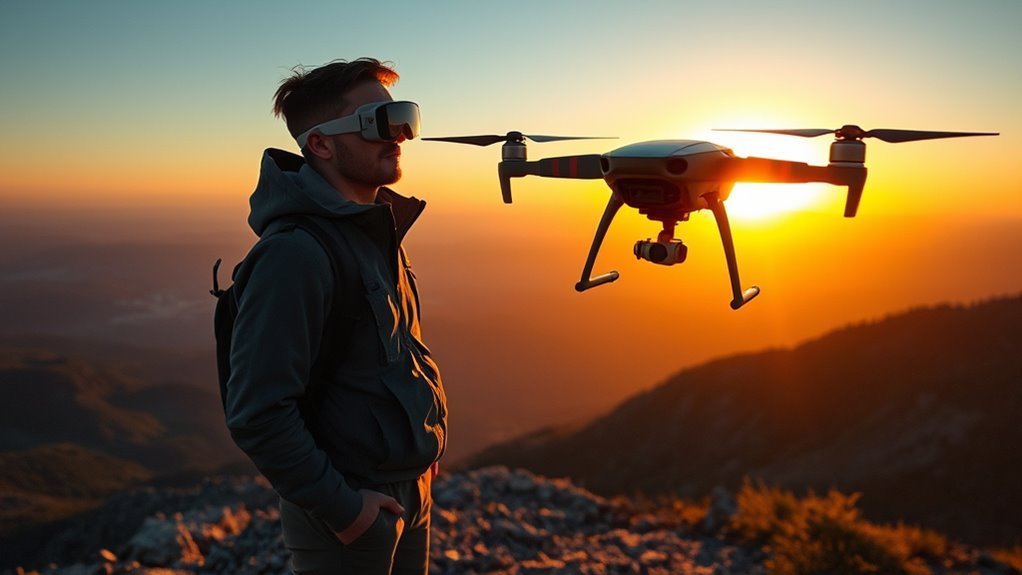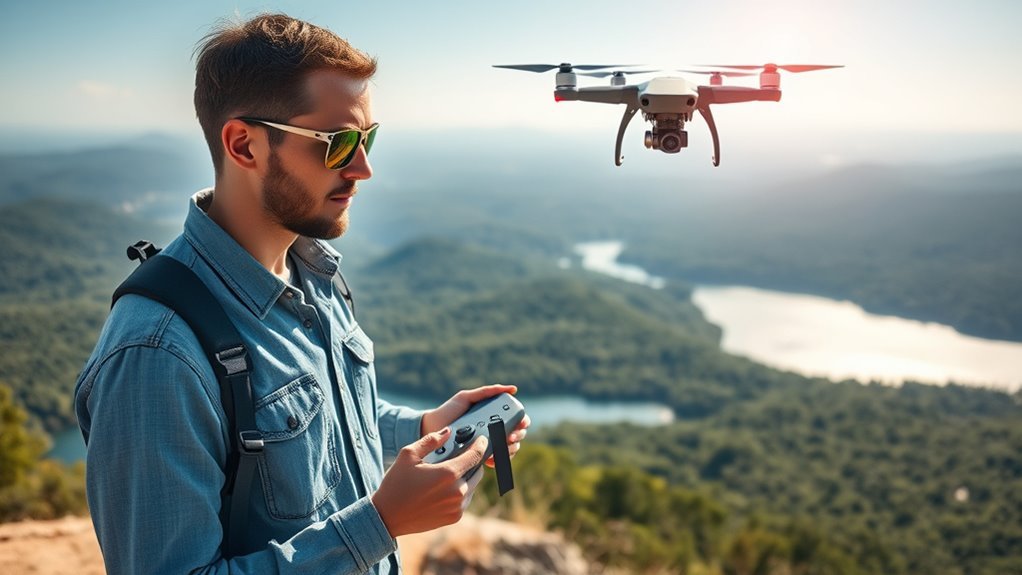A drone pilot operates unmanned aerial vehicles (UAVs) for tasks like capturing stunning visuals and gathering essential data across various industries. You’ll master flight techniques, navigation skills, and understand safety regulations to guarantee compliance while soaring through the skies. Whether you’re working in agriculture, real estate, or media, the opportunities are vast and exciting. Curious about what it takes to succeed as a drone pilot and the future of this dynamic field?
Overview of Drone Piloting

Drone piloting is an exciting blend of technology and skill, offering a unique perspective on the world from above. As a drone pilot, you’ll harness the power of aerial photography and surveying to capture stunning visuals and gather essential data. The freedom to soar above landscapes allows you to explore environments in ways traditional photography can’t match. Whether you’re surveying land for development or capturing breathtaking images for a creative project, the versatility of drones is unmatched. With the right equipment, you can obtain high-resolution images and detailed topographical maps, making your work invaluable across various industries. Embracing drone piloting opens doors to limitless possibilities, empowering you to redefine how we perceive and interact with our surroundings. Additionally, advancements in AI-driven enhancements are revolutionizing the way pilots operate drones, making them more intuitive and efficient. This evolution is largely driven by substantial funding in research and development that enhances product reliability and performance.
Skills Required for Drone Pilots

To excel as a drone pilot, you’ll need a diverse set of skills that go beyond mere technical knowledge. Mastering flight techniques is essential, as they directly influence your ability to control the drone smoothly and efficiently. Strong navigation skills are equally important, enabling you to maneuver in various environments and avoid obstacles.
Here’s a concise overview of key skills:
| Skill Type | Description |
|---|---|
| Flight Techniques | Control, stability, and maneuverability |
| Navigation Skills | Route planning and obstacle avoidance |
| Problem Solving | Adapting to unexpected challenges |
| Communication | Collaborating with team members |
In addition to these skills, understanding how to prepare your drone for cold weather can significantly enhance your performance in challenging conditions.
Types of Drones and Their Uses

While the world of unmanned aerial vehicles (UAVs) may seem vast, understanding the different types of drones and their specific applications can help you choose the right one for your needs. Commercial drones are often used for tasks like mapping and inspections, while recreational drones provide fun and creativity for hobbyists. Agricultural drones optimize crop monitoring and management. Delivery drones are revolutionizing logistics, transporting goods directly to your door. Surveillance drones enhance security and situational awareness, and racing drones cater to adrenaline seekers in competitive environments. Photography drones enable stunning aerial shots, perfect for capturing breathtaking landscapes. Finally, industrial drones streamline operations in sectors like construction and energy, addressing inefficiencies and hazards that traditional methods face. Each type offers unique capabilities, giving you the freedom to explore countless possibilities. Moreover, advanced collision avoidance technology in certain models enhances safety during flight, making them suitable for a broader range of applications.
Industries That Employ Drone Pilots
As the demand for aerial data and imagery grows, various industries are increasingly turning to drone pilots to enhance their operations. In agriculture, drone pilots are revolutionizing farming practices through agricultural applications, such as crop monitoring and precision farming. They help farmers optimize yields and reduce costs by providing real-time data on crop health. Furthermore, Delair’s cameras enable farmers to implement targeted treatments only where necessary, maximizing efficiency and sustainability in their practices. By utilizing precision crop detection technologies, drone pilots can further enhance their effectiveness in identifying crop stress and health issues.
In the domain of media and marketing, aerial photography captured by drones adds a dynamic perspective to storytelling, elevating promotional content. Real estate agents also leverage drone footage to showcase properties from stunning angles, attracting potential buyers. Additionally, construction firms rely on drone pilots for site surveys and progress tracking. As you can see, the versatility of drone pilots is reshaping multiple sectors, offering innovative solutions for modern challenges.
Certification and Licensing Requirements
Obtaining the necessary certification and licensing is essential for anyone looking to become a professional drone pilot, especially given the strict regulations governing aerial operations. You’ll need to navigate the certification process, which often involves a combination of training courses and practical experience. Typically, you’ll be required to pass licensing exams that test your knowledge of aviation regulations, airspace classification, and safe flying practices. This not only guarantees you’re competent but also empowers you to operate with confidence. By meeting these requirements, you gain the freedom to explore diverse job opportunities in industries like photography, agriculture, and surveying. Ultimately, achieving certification and licensing is your key to accessing the skies and pursuing your passion as a drone pilot.
The Role of Technology in Drone Operations
With advancements in technology driving innovation, the role of technology in drone operations has become increasingly pivotal. You’ll find that aerial technology is reshaping industries, giving drone pilots unprecedented capabilities. Here are some key elements to reflect upon:
Advancements in technology are revolutionizing drone operations, empowering pilots with unprecedented capabilities and reshaping entire industries.
- Autonomous drones: Operating without constant human control, they enhance efficiency. The integration of IoT sensors allows drones to collect and transmit data seamlessly, further improving operational effectiveness.
- Real-time data transmission: Guarantees immediate analysis and decision-making.
- Enhanced navigation systems: Allow for precise flight paths and obstacle avoidance.
- High-resolution cameras: Capture stunning imagery and detailed inspections.
- AI integration: Optimizes flight patterns and improves data collection.
As a drone pilot, understanding these technological advancements not only boosts your operational effectiveness but also opens up a world of possibilities, empowering you to explore and innovate freely. Moreover, the integration of real-time monitoring enhances safety protocols and mitigates risks in dynamic flight environments.
Safety Regulations and Best Practices
As a drone pilot, you need to be acutely aware of the airspace around you to guarantee safe operations. Following a thorough pre-flight checklist not only helps you comply with safety regulations but also minimizes risks during your flight. Understanding these best practices is essential for protecting both your drone and the people nearby. Additionally, ensuring compliance with local drone regulations is crucial for maintaining your flying privileges and avoiding legal issues. Registering your drone before outdoor flight is one of the key steps in adhering to drone registration requirements.
Airspace Awareness
While traversing the skies as a drone pilot, understanding airspace awareness is essential for ensuring safety and compliance with regulations. Familiarizing yourself with airspace classifications and altitude restrictions is vital to enjoy the freedom of flight responsibly. Here are some key points to take into account:
- Know the different airspace types (Class A, B, C, D, E, G)
- Respect altitude restrictions to avoid collisions
- Stay updated on temporary flight restrictions (TFRs)
- Use apps and resources to track airspace changes
- Always maintain visual line of sight (VLOS)
Pre-flight Checklist
A thorough pre-flight checklist is essential for any drone pilot aiming to assure safety and compliance with regulations. Before you take to the skies, make sure you’ve performed necessary drone maintenance—check battery levels, propeller integrity, and camera functionality. Verify your equipment’s calibration and confirm that all firmware is up to date.
Next, assess environmental conditions like wind speed and weather forecasts, as these factors greatly impact flight safety. Don’t forget to review local airspace regulations and any temporary flight restrictions.
Career Opportunities for Drone Pilots
As a drone pilot, you’ll find a range of job roles waiting for you, from aerial photography to agricultural monitoring. With industries increasingly recognizing the value of drone technology, the demand for skilled pilots is on the rise. Exploring these opportunities could open the door to a fulfilling career in a rapidly evolving field. Additionally, leveraging advanced AI integration can enhance operational efficiency in various applications of drone technology. By utilizing real-time data processing, drone pilots can ensure more accurate and timely decision-making during their operations.
Job Roles Available
With the rapid growth of drone technology, numerous job roles have emerged for skilled drone pilots across various industries. As you explore these career paths, you’ll find diverse job responsibilities that cater to different interests and expertise. Here are some exciting opportunities:
- Aerial photography/videography for real estate or events
- Agricultural monitoring and crop surveillance
- Infrastructure inspection for bridges, power lines, and pipelines
- Search and rescue operations in emergency services
- Drone delivery services for logistics companies
These roles not only allow you to harness your flying skills but also let you contribute to innovative projects, all while enjoying the freedom that comes with working in a rapidly evolving field.
Industry Demand Growth
The demand for skilled drone pilots is skyrocketing, driven by advancements in technology and an expanding array of applications across multiple sectors. As you explore this exciting career path, you’ll notice significant market trends that highlight the versatility of drone use—from agriculture to real estate, filmmaking to emergency services. These trends open up numerous job opportunities, allowing you to tap into your passion while enjoying freedom in your work environment. Companies are increasingly seeking certified pilots who can operate drones for data collection, inspections, and aerial photography. With regulations evolving and industries adopting drone technology, now’s the perfect time to invest in your skills and seize the opportunities that await in this dynamic field. Your future as a drone pilot looks bright!
The Future of Drone Piloting
While advancements in technology continue to reshape industries, the future of drone piloting promises to be both exciting and transformative. You’ll find that the rise of autonomous drones and innovative technology will redefine how you engage with the skies. Consider the possibilities:
- Advanced AI for smarter navigation
- Enhanced safety features reducing accidents
- Expanded applications across agriculture, delivery, and surveillance
- Real-time data analytics for informed decision-making
- Increased regulatory support fostering growth and innovation
As these drone innovations unfold, you’ll have the chance to explore new fields, gain independence, and even shape the future of piloting. Embracing these changes means you can be at the forefront of a revolution that grants you unparalleled freedom in the skies. The integration of eco-friendly design approaches ensures that as you soar through the air, you’ll be contributing to a more sustainable future. Additionally, the emergence of alternatives will encourage diverse innovations that push the boundaries of what drones can achieve.
Tips for Aspiring Drone Pilots
As you commence your journey to become a drone pilot, it is vital to equip yourself with both technical skills and a solid understanding of regulations. Mastering drone photography and aerial surveying can set you apart in this exciting field. Here are some essential tips to guide you:
| Tip | Description |
|---|---|
| Know the Regulations | Familiarize yourself with local laws. |
| Practice Regularly | Hone your flying skills in various conditions. |
| Invest in Quality Gear | Use reliable drones and cameras for better results. |
| Network with Others | Join communities to learn and share experiences. |
| Keep Learning | Stay updated on technology and techniques. |
Understanding NDAA compliance is crucial for drone pilots, especially if you plan to work with government agencies or in sensitive environments.
Frequently Asked Questions
What Is the Average Salary for a Drone Pilot?
Imagine soaring through the skies! As a drone pilot, you could earn between $50,000 and $100,000 annually. With rising industry demand, drone pilot salaries are on the rise, offering both freedom and financial rewards.
How Do Weather Conditions Affect Drone Flying?
Weather conditions greatly impact your drone flying. High wind speeds can hinder stability and control, while rain can damage equipment and reduce visibility. Understanding these factors will help you navigate challenges and guarantee safer flights.
Can Hobbyists Fly Drones Commercially?
Yes, hobbyists can fly drones commercially, but they must adhere to hobbyist regulations and obtain proper drone permits. Understanding these requirements guarantees you can enjoy your passion while legally pursuing opportunities in the commercial drone market.
What Are Common Misconceptions About Drone Pilots?
You might think all drone pilots can fly freely, but misconceptions abound. Many don’t realize drone regulations require pilot certifications for commercial use, ensuring safety and compliance, which can limit the perceived freedom of flying drones.
How Can I Find Drone Pilot Job Opportunities?
To find drone pilot job opportunities, explore specialized drone job boards and attend networking events. Connecting with industry professionals can open doors, helping you discover roles that offer the freedom and flexibility you desire in your career.

